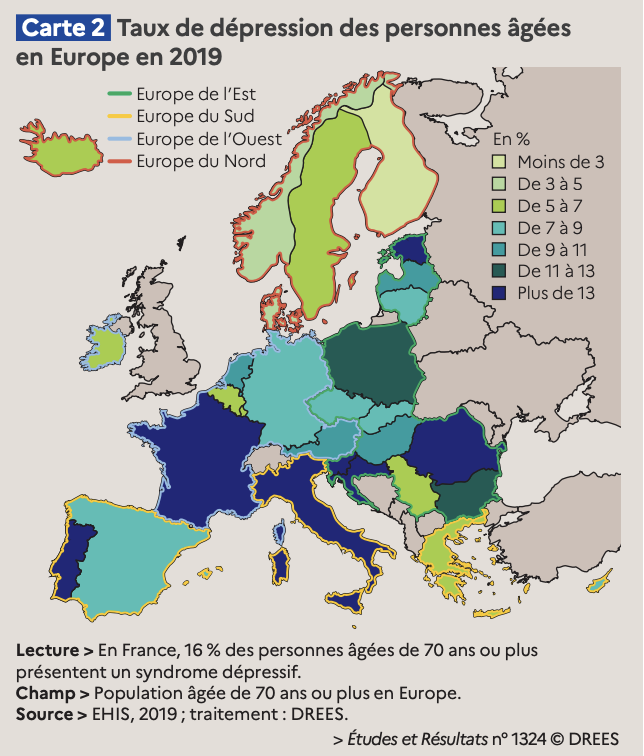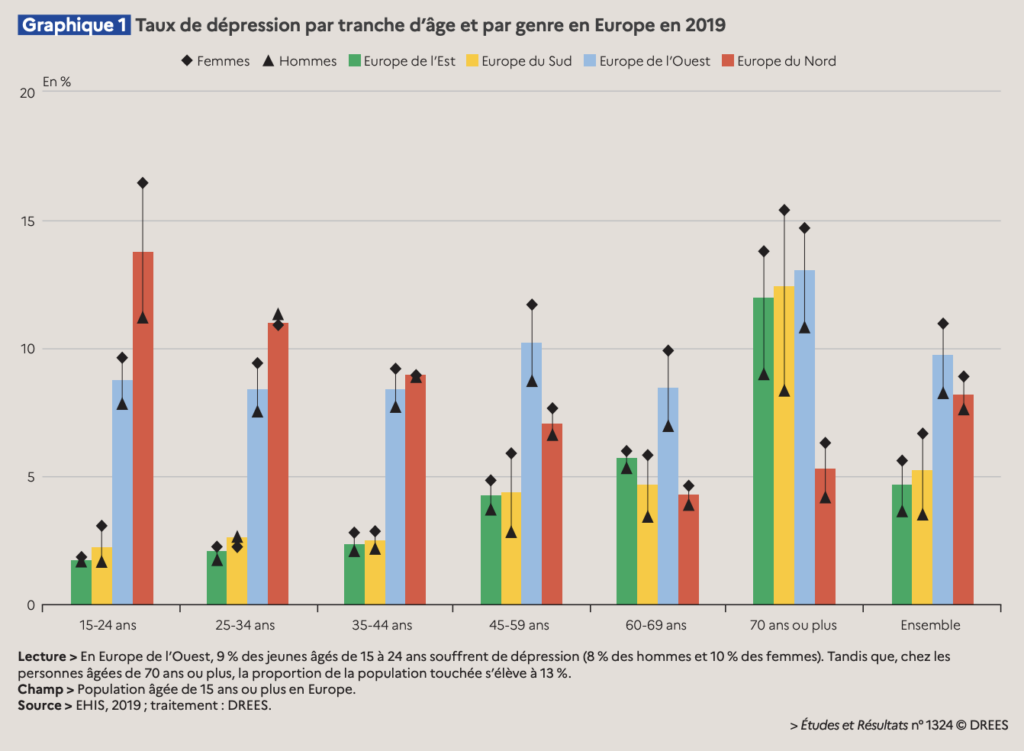In 2019, before the COVID-19 pandemic highlights the fragility of mental health worldwide. Some 6% of Europeans were already suffering from depressive syndromes, according to a DREES study based on the European Health Interview Survey (EHIS). This overall rate masks major geographical and demographic disparities, particularly for depression among seniors, an age group that is particularly vulnerable to this problem.

Depression among seniors: Marked regional disparities
The rate of depression among seniors aged 70 and over varies considerably from region to region. On average, 12% of elderly people in southern and eastern European countries suffer from depressive syndromes, while in northern Europe the figure drops to 5%. France, with a rate of 16%, is one of the most affected countries in Western Europe, although Portugal and Croatia, where prevalence exceeds 15%, are not far behind. In contrast, Greece and Serbia have remarkably low rates, hovering around 5%.

According to the DREES study, these disparities can be explained by differences in care systems, living standards and social structures in the countries concerned. In Northern Europe, massive investment in long-term care (LTC) contributes to better care for seniors, reducing their risk of suffering from depressive syndrome.
Older women more affected by depression than men
Depression affects older women more than their male counterparts in all regions. This imbalance is exacerbated by factors such as widowhood, which is particularly prevalent in Eastern Europe, where the gap in life expectancy between men and women is considerable. Indeed, widowed women over 70 are at greater risk of depression, particularly in countries with weak social and family support systems.

Poor health and social isolation: key factors in depression among seniors
Poor health is one of the main factors associated with depression among senior citizens in Europe.
On average, older people in poor health are 27% more likely to suffer from depression than those in good health. This effect is particularly pronounced in Southern Europe (32%), where chronic illness and physical limitations are more common.
Social isolation also plays a decisive role.
Seniors with a high level of social support are less likely to suffer from depression (-11% on average), an effect particularly visible in Western Europe (-17%). Conversely, in countries where senior citizens are more often isolated (such as Eastern Europe), the risk increases. Social isolation is a scourge to be combated, since studies such as the Isolement et Solitude barometer conducted by the Petits Frères des Pauvres show that social isolation among the elderly considerably increases the risk of developing serious illnesses. The risk of having a heart attack is increased by 29%, of having a stroke by 32%, and so on.
The role of widowhood and income
Widowhood increases the probability of suffering from depression by 4% on average, an effect particularly marked in Eastern Europe (+8%). In Northern countries, where social and medical services for widowed seniors are more developed, this impact is less marked. What’s more, the gap in life expectancy between men and women is less marked there than in southern or eastern European countries.

As for income level, its influence on depression is limited overall, except in Southern Europe, where the most affluent senior citizens are 2 to 8% less likely to be depressed than the most modest. These economic disparities help to explain why seniors in southern and eastern European countries, where poverty and material insecurity are more common, are more affected by depression.
Challenges and prospects for depression among European seniors
This study highlights the importance of comprehensive care to prevent depression among seniors. In particular, it highlights :
- The urgent need to improve healthcare for seniors, particularly in southern and eastern countries.
- The crucial role of social support: strengthening local networks, whether family, community or institutional, to reduce the isolation and social death of senior citizens.
- The need for targeted policies for women, especially widows, to limit their vulnerability to depression.
Finally, the COVID-19 pandemic has exacerbated the challenges posed by depression among the elderly, underlining the urgency of implementing sustainable and inclusive policies to preserve their mental health. Post-2020 data will therefore be crucial in fine-tuning responses to this issue, which concerns a growing proportion of the European population. What’s more, with depression affecting young people in particular since the pandemic, It’s crucial that we review our care system to ensure that tomorrow’s seniors don’t face any psychological problems.
Published by the Editorial Staff on
